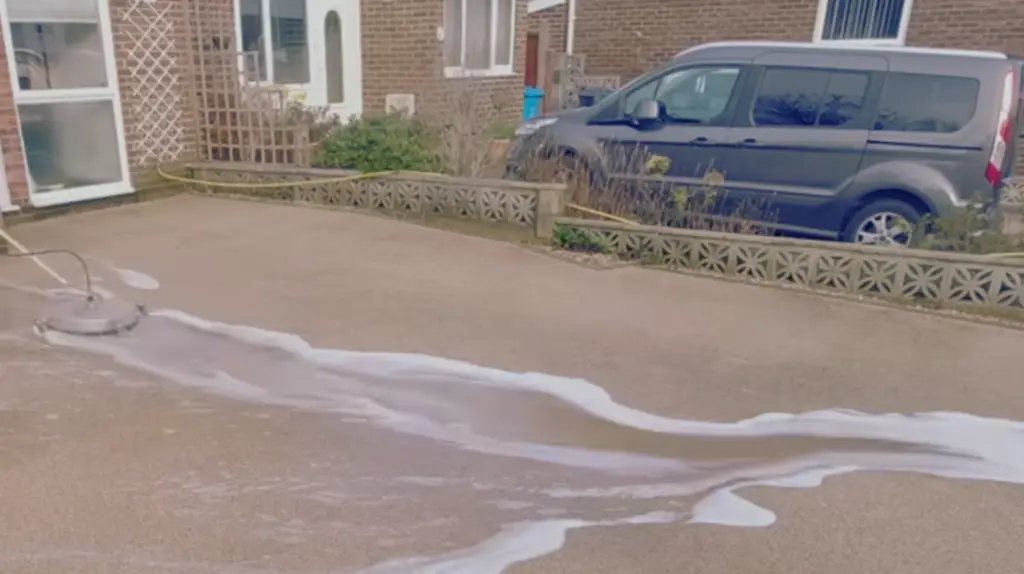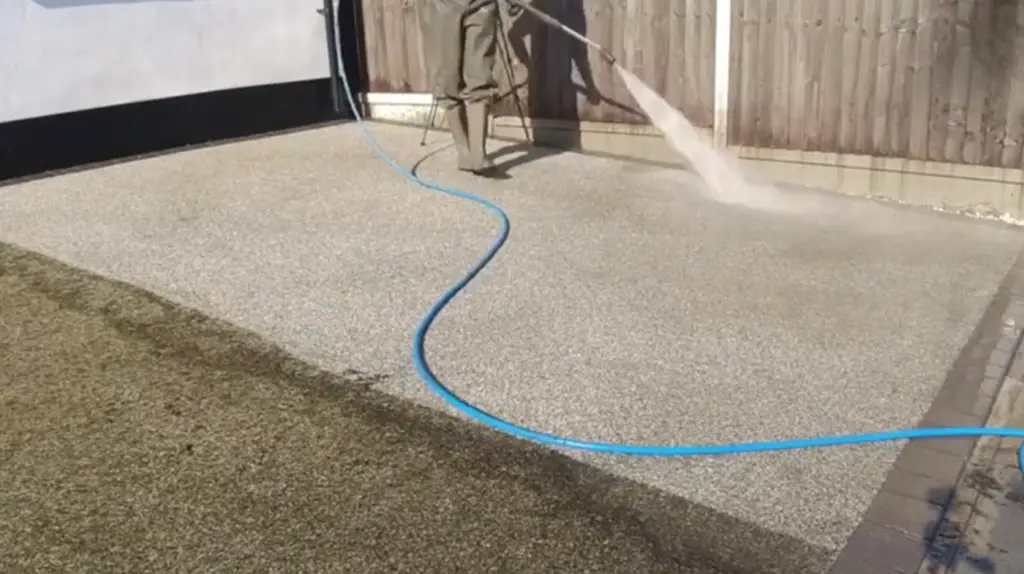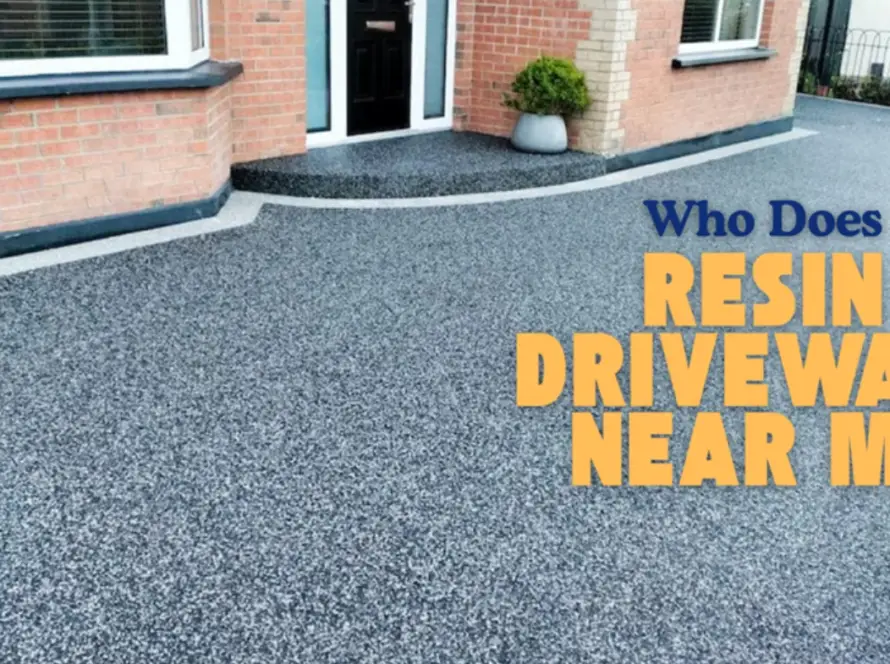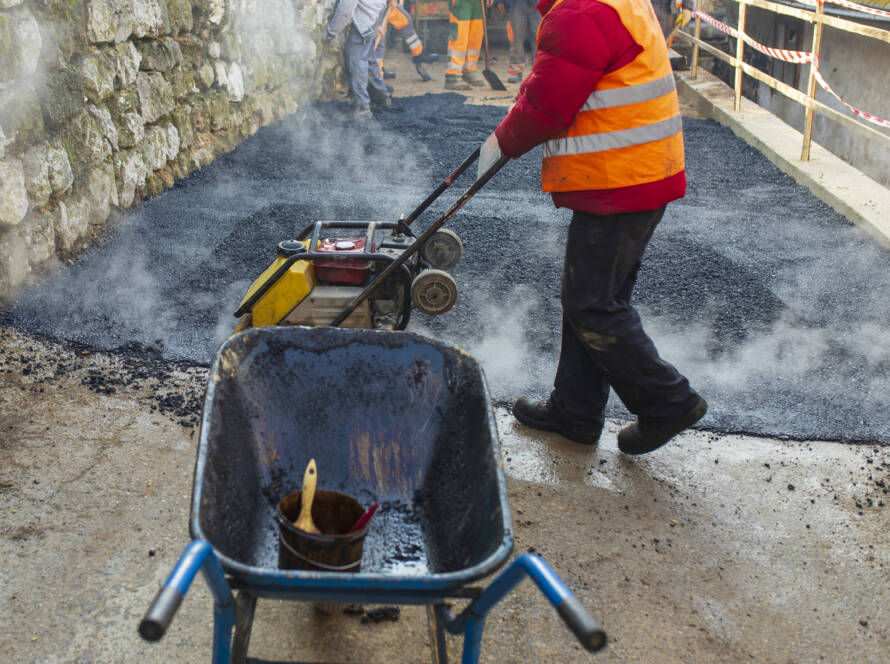Your resin driveway deserves more than quick rinses with a garden hose. Across the UK, homeowners are discovering that proper maintenance involves systematic weekly sweeping, targeted pressure washing techniques, and strategic stain prevention methods that preserve their investment for decades.
This comprehensive guide reveals professional secrets used by leading contractors, from tackling stubborn oil spills with specialized degreasers to implementing seasonal protection strategies that prevent costly damage.
You’ll master the art of distinguishing between resin-bound and bonded surfaces, learn advanced cleaning protocols that maintain warranty compliance, and discover innovative maintenance technologies that transform routine upkeep into effortless preservation.
Ready to unlock the secrets that keep your driveway looking professionally installed year after year?
Essential Cleaning Steps for Your Resin Driveway
Regular maintenance is fundamental to preserving your driveway’s appearance and structural integrity.
Step 1: Regular Sweeping and Debris Removal
The first line of defence involves weekly sweeping with a stiff-bristled broom. This prevents organic matter from accumulating in the porous surface, which could lead to weed growth or discolouration over time.
Remove leaves, twigs, and loose debris promptly, as decomposing organic material can create unsightly stains and provide nutrients for unwanted vegetation growth.
Step 2: Weekly Pressure Washing
Pressure washing remains the most effective method for routine cleaning. Use a pressure washer set to medium pressure (around 100-150 bar) to avoid damaging the resin surface while effectively removing dirt and grime.
Hold the nozzle at least 12 inches from the surface and work in systematic sections. This approach ensures even cleaning without creating streaks or damaging the aggregate bonds.
Step 3: Treating Oil and Fuel Stains
Address oil spills immediately using absorbent materials like cat litter or sawdust. Allow the absorbent to soak up the liquid for several hours before sweeping away.
For set-in stains, apply a degreasing agent specifically designed for resin surfaces, allow it to penetrate for 10-15 minutes, then rinse with clean water.
Step 4: Weed Prevention and Removal
Despite resin’s natural weed resistance, occasional growth may occur in areas where debris has accumulated. Remove weeds by hand or use a suitable herbicide, avoiding products containing glyphosate, which can discolour the resin.
Apply pre-emergent herbicides in early spring to prevent seed germination throughout the growing season.
Understanding Your Resin Surface Type
Different resin systems require specific cleaning approaches for optimal results.
Resin Bound vs Resin Bonded Maintenance
Resin-bound surfaces feature a smooth, permeable finish that allows water drainage through the surface. These require gentle cleaning methods to preserve the integral aggregate-resin matrix.
Bonded resin driveways, or resin-bonded surfaces, have exposed aggregate on top, creating a textured finish that may trap more debris but provides excellent grip and visual appeal.
Professional Surface Finishing Considerations
When working with professional surface finishing contractors, they often apply protective sealers that require specific maintenance protocols. These treatments enhance durability but may need periodic reapplication every 3-5 years.
Seasonal Maintenance Requirements

Adapting your cleaning routine to UK weather patterns ensures year-round surface protection.
Spring Deep Cleaning Protocol
Begin each year with comprehensive cleaning to remove winter debris and assess any damage from freeze-thaw cycles. This timing aligns with optimal weather conditions for thorough cleaning and any necessary repairs.
Apply moss and algae treatments during spring months when growth typically accelerates due to increased moisture and temperature.
Summer Maintenance Focus
During warmer months, concentrate on preventing road surface damage from UV exposure and increased usage. Regular cleaning prevents organic staining and maintains the surface’s reflective properties.
Monitor high-traffic areas for wear patterns and address any issues before they compromise the surface integrity.
Winter Protection Strategies
Avoid using rock salt or harsh de-icing chemicals that can damage the resin matrix. Instead, use sand for traction or specialized resin-safe de-icing products.
Clear snow promptly using plastic shovels rather than metal tools that could scratch or gouge the surface.
Advanced Stain Removal Techniques
Certain stains require specialized treatment methods beyond standard cleaning protocols.
Organic Stain Treatment
Leaf stains, berry marks, and other organic discolorations respond well to oxygen bleach solutions. Mix according to the manufacturer’s instructions and allow adequate contact time before rinsing thoroughly.
For persistent organic stains, create a paste using bicarbonate of soda and water, apply to the affected area, and leave overnight before scrubbing gently with a soft brush.
Rust and Metal Stain Removal
Metal stains from garden furniture or tools require acidic cleaners specifically formulated for resin surfaces. Test any product in an inconspicuous area first to ensure compatibility.
Apply the cleaner according to instructions, allowing appropriate dwell time before neutralizing with clean water and ensuring complete removal of all residues.
Professional Maintenance Services
Engaging specialists ensures optimal care for your investment while maintaining warranty compliance.
When to Call Professionals
Complex staining, surface damage assessment, or annual deep cleaning may warrant professional intervention. Contractors possess specialized equipment and products not available to homeowners.
Professional surface finishing experts can also assess whether your driveway requires resealing or minor repairs to maintain optimal performance.
Preventive Maintenance Programs
Many contractors offer annual maintenance packages that include deep cleaning, minor repairs, and protective treatments. These programs often prove more cost-effective than reactive maintenance approaches.
Regular professional inspections can identify potential issues before they become expensive problems, particularly important for preventing road surface damage in high-traffic areas.
Environmental Considerations
Responsible maintenance practices protect both your driveway and the surrounding environment.
Sustainable Cleaning Products
Choose biodegradable cleaning agents that won’t harm plants or contaminate groundwater. Many eco-friendly products prove equally effective while supporting environmental responsibility.
The permeable nature of resin-bound surfaces means cleaning products can pass through to soil and groundwater systems, making product selection particularly important.
Water Conservation Techniques
Use targeted cleaning methods rather than broad spray patterns to minimize water usage. Spot-cleaning specific areas often proves more efficient than wholesale surface washing.
Consider collecting rainwater for cleaning purposes, reducing reliance on treated mains water while maintaining cleaning effectiveness.
Long-term Surface Protection
Implementing comprehensive protection strategies extends your driveway’s lifespan significantly.
Protective Treatments
Annual application of UV-protective sealers maintains colour stability and prevents surface degradation. These treatments represent a small investment compared to premature replacement costs.
Quality sealers also enhance stain resistance, making routine cleaning more effective and reducing the likelihood of permanent discoloration.
Traffic Management
Implementing simple measures like designated parking areas and avoiding sharp turning movements helps minimize surface wear. These practices become particularly important in commercial applications.
Regular inspection of heavy-use areas allows early intervention before minor wear becomes significant damage requiring expensive repairs.
Troubleshooting Common Issues

Understanding typical problems helps maintain your driveway effectively while avoiding costly mistakes.
Surface Discolouration Problems
Uneven colour development often results from inconsistent cleaning practices or inappropriate product use. Establish regular maintenance routines to prevent such issues.
If discolouration occurs, professional assessment can determine whether surface cleaning or more intensive treatment is required.
Drainage Issues
Blocked drainage typically results from debris accumulation or inappropriate cleaning products that create residue films. Regular maintenance prevents most drainage problems.
For persistent issues, professional jet-washing or specialist cleaning agents may be necessary to restore proper water flow through the surface.
Innovative Maintenance Technologies
Modern cleaning approaches leverage new technologies for enhanced effectiveness and efficiency.
Innovative Road Construction Methods in Maintenance
Advanced cleaning systems developed for commercial road maintenance adapt well to residential resin surfaces. These innovative road construction methods often prove more effective than traditional approaches.
Steam cleaning systems, for example, provide deep cleaning without chemical residues while being gentle enough for residential use.
Smart Maintenance Scheduling
Weather-based maintenance scheduling optimizes cleaning effectiveness while minimizing effort. Timing cleaning activities around weather patterns improves results significantly.
Digital monitoring systems can track maintenance activities and surface condition, helping optimize cleaning schedules and identify developing issues early.
Frequently Asked Questions
How often should I clean my resin driveway?
Weekly sweeping and monthly pressure washing provide optimal maintenance for most residential applications. High-traffic areas may require more frequent attention, while low-use surfaces might need less intensive care.
Can I use bleach on my resin driveway?
Avoid chlorine bleach as it can damage the resin matrix and cause discoloration. Instead, use oxygen-based bleaches or specialized resin cleaning products that won’t compromise surface integrity.
What’s the best way to remove stubborn stains?
For persistent stains, create a paste using bicarbonate of soda and water, apply overnight, then scrub gently with a soft brush. For oil-based stains, use degreasing agents specifically designed for resin surfaces.
When does my resin driveway need professional maintenance?
Annual professional deep cleaning helps maintain warranty compliance and surface condition. Additionally, seek professional help for complex staining, drainage issues, or if you notice surface damage or excessive wear patterns.
Keep Your Resin Driveway Looking Great with Proper Maintenance and Care
Proper maintenance transforms your resin driveway from a simple surface into a long-lasting investment that enhances your property’s value and appeal.
By following these comprehensive cleaning protocols and understanding your surface’s specific requirements, you’ll ensure optimal performance throughout its lifespan.
Remember that consistent care proves far more cost-effective than reactive maintenance, while professional guidance helps navigate complex issues when they arise.



